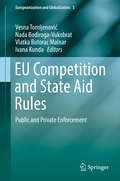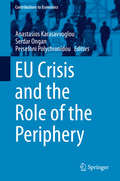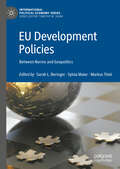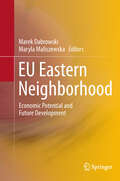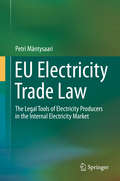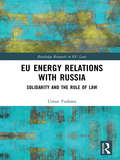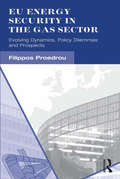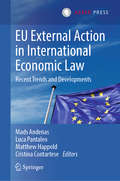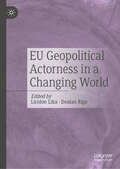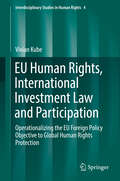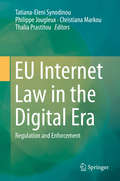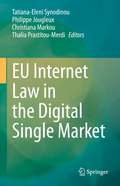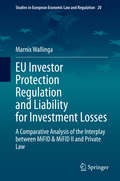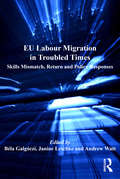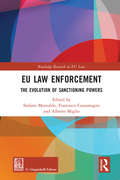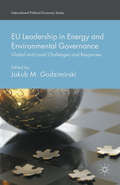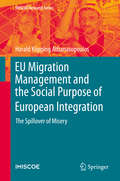- Table View
- List View
EU Competition Law and the Financial Services Sector (Lloyd's Commercial Law Library)
by Andrea ListaCompetition law is a complex and constantly evolving area of law which affects every aspect of the market economy, including the financial services sector. This book is a comprehensive and practical guide to the application of the EU competition rules to banking and insurance industries. This book is divided into two parts: the first part explores the application of Articles 101, 102 and 107 TFEU to the insurance industry. Emphasis is placed on recent changes which have progressively eroded the block exemption regime that traditionally benefited the insurance industry. In the second part of the book, focus is on the application of the Articles of TFEU to the banking industry, with specific reference to card payment systems, which give rise to some of the most intricate antitrust issues in the financial services sector. Relevant Commission decisions and European Court of Justice case law are discussed and suggestions are made for an alternative regulatory framework through comparative analysis of US regulations. This book will be an invaluable reference point for legal practitioners specialising in EU Competition law, as well as postgraduate students and academic researchers working in competition law and the financial services sector.
EU Competition Law, the Consumer Interest and Data Protection
by Federico FerrettiThe legitimacy or illegitimacy of information exchanges between competitors remains a topical debate with regard to EU competition law and policy. This book reexamines the issue in the retail financial services sector, focusing on the peculiar problems that it poses for EU market integration, consumer policy and protection and the intersection with fundamental rights. It analyzes and reflects on the relevant case law and guidelines offered by the corresponding European authorities, providing a critique of the current approach and advancing the proposition that information markets themselves need attention, in addition to the markets that they serve. The book also advances new perspectives on cases in which consumers' personal information is involved in the exchange, recognizing the inevitable interaction between EU competition law, the interests and protection of consumers and personal data protection. It suggests that the status quo under competition law is unsatisfactorily short sighted and that the EU should take a holistic approach (including information markets) to the analysis of competition law, reflecting consumer protection and fundamental rights aspects in the assessment.
EU Competition and State Aid Rules
by Nada Bodiroga-Vukobrat Vesna Tomljenović Vlatka Butorac Malnar Ivana KundaThe book provides a scrutiny of legislative novelties and case law in the area of EU competition and state aid rules, with the particular emphasis on the interaction between public and private enforcement of the mentioned rules. The target readers are all stakeholders and others involved in the process of enforcement - judges, attorneys at law, corporate lawyers and market participants who have sustained or could sustain damage as a result of the violations of competition or state aid rules. The efficient enforcement of competition and state aid rules is one of the keys to the successful economic development and stability of the EU internal market. While the Commission is charged with application of EU state aid rules, EU competition rules are applied by national enforcers as well. Proper and uniform application across Member States is thus one of the biggest challenges in this area of law. Particularly important in this regard are the national enforcers responsible for the direct application of EU competition rules.
EU Crisis and the Role of the Periphery
by Anastasios Karasavvoglou Persefoni Polychronidou Serdar OnganThe European economy is still in recession, even though there are some weak indications of stabilization. This book examines important aspects of the crisis in selected countries of Southern Europe, the Balkans and Eastern Europe. The intensity of the crisis and its economic and social repercussions have varied from country to country, generally impacting the core countries less than those on the periphery. The countries in the latter group currently face significant structural challenges with regard to improving productivity and competitiveness, including the areas of investment, climate, the labour market, and the public sector. The book not only illustrates the scope of the problem, but also informs readers on the policies implemented to address it, and discusses the progress some of the economies have already made. Special topics include the convergence hypothesis, agriculture and growth, Public-Private Partnership in Infrastructure (PPPI), and the labour market.
EU Development Policies: Between Norms And Geopolitics (International Political Economy Series)
by Markus Thiel Sarah L. Beringer Sylvia MaierThe European Union (EU), while collectively constituting the world’s largest development provider, has come under internal and external pressures over the past decade. This book argues that the EU’s development policies are situated between the bloc’s normative ideals and the global geopolitical realities in which it is embedded. In order to investigate these tensions, it asks how far the 'normative power' Europe concept exists in EU development policies, and how far it is recognizable in the EU’s focus on human rights, the rule of law, and sustainability. In light of the tension in EU development policies between those ideals and the necessity to project neoliberal and geopolitical interests, how do receiving countries perceive the EU’s development efforts? This volume, complete with contributions from academics from a wide range of disciplines based all around the globe, provides answers to these essential questions.
EU Eastern Neighborhood: Economic Potential and Future Development
by Maryla Maliszewska Marek DabrowskiThe selected papers in this volume were prepared under the research project on "EU Eastern Neighborhood: Economic Potential and Future Development (ENEPO)" funded by the EU Sixth Framework Program. They discuss the broad spectrum of development issues in the EU Eastern Neighborhood and economic relations between the enlarged EU and its Eastern neighbors in the former USSR. Individual chapters address areas of economic and social development, trade, energy, investment, migration, costs and benefits of economic reforms, development assistance and political economy of policy reforms. In particular, they examine interrelations and mutual synergies between trade liberalization, inflow of foreign investment, economic and institutional reforms and a reduction of income and development disparities. The publication thus closes an important knowledge gap in respect to the economic, social and institutional development of the CIS region and its economic relations with the EU.
EU Electricity Trade Law
by Petri MäntysaariThis book aims to describe the mechanisms of the internal wholesale electricity market in terms of the legal tools and practices used by electricity producers, the most important market participants. In this regard, the focus is on Northwestern Europe. Because of the book's functional perspective, it is not limited to the external regulation of electricity markets at the EU level and also describes the business models and practices employed by electricity producers. Both the physical and financial marketplaces are examined and topics including electricity supply, balancing, transmission and derivatives are covered. The target for the completion of the EU's internal electricity market was 2014. The internal wholesale electricity market is very important not only for electricity producers, suppliers and major end consumers but also for network operators, marketplace operators, electricity technology firms, investment firms and market regulators.
EU Energy Relations With Russia: Solidarity and the Rule of Law (Routledge Research in EU Law)
by Umut TurksenThis book provides a detailed analysis of the legal framework in which the energy trade between the European Union and the Russian Federation has been conducted. Using case studies of eight member states, it critically examines the EU’s ability and the duty of its Member States to conduct their external energy trade in accordance with the principle of solidarity. Providing a comprehensive analysis of the principle of solidarity as provided in the acquis communautaire of the EU, the book critically analyses the legal framework pertaining to EU-Russia energy trade to ascertain whether, and to what extent, it satisfies the requirements of the rule of law.
EU Energy Security in the Gas Sector: Evolving Dynamics, Policy Dilemmas and Prospects
by Filippos ProedrouThis book fills an important gap in the literature on energy security in the gas sector in the European Union. Whilst the emphasis is often on energy security in the oil sector, the gas sector has grown in importance in recent decades, with increasing liberalization raising critical questions for the security of gas supplies. The share of gas in Europe's energy mix is rising and the differences between the politics and economics of gas and oil supply are becoming more pronounced. The author sheds light on the state of EU energy security in the gas sector, its interdependence with external suppliers and the current gas strategy. He examines the role of energy companies, EU member-states and EU institutions, locates the main developments in the gas sector and focuses on the principal challenges posed by such fundamental changes. The author scrutinizes the EU's relations with its main gas supplier, Russia, as well as with alternative suppliers, elaborates on the key infrastructure projects on the table and their principal ramifications, and discusses the main policies that member-states pursue to achieve energy security as well as the EU's internal contradictions. The book concludes with policy recommendations, particularly in the light of tougher environmental regulation.
EU Environmental Policy: Its journey to centre stage
by Nigel HaighAt a time when Europeans across the continent are focused on the EU's future direction, this book provides an important contribution to the current debate. Created for reasons quite unconnected with the environment, the EU has been given a compelling new justification by the success of its environmental policy. A number of factors – including a number of threats that came to prominence in the 1980s, and the new concept of 'sustainable development' – are responsible for pushing environmental policy to the forefront of its agenda. Nigel Haigh, a leading authority on the development and implementation of EU environmental policy, traces its evolution from obscurity to centrality. Drawing on a range of articles and lectures, he demonstrates how the EU has not only adapted itself to take on entirely new subject matter, but also has contributed to solving problems which individual Member States could not have dealt with on their own. The book goes on to contextualise the issues throughout its history and offers insight into the future role of the EU in environmental matters. This book is a valuable resource for academics and scholars as well as professionals and policy makers in the areas of environment and sustainability, politics, international relations and European affairs.
EU External Action in International Economic Law: Recent Trends and Developments
by Mads Andenas Matthew Happold Luca Pantaleo Cristina ContarteseThe topic of this book is the external action of the EU within international economic law, with a special focus on investment law. The aim of the volume is to provide the reader with an appraisal of the most recent trends and developments that have characterised a field that has been rapidly evolving and in which the EU has imposed itself as a leading actor.The book is aimed at academics, practitioners and graduate students as well as at EU officials and judges, all of whom should find the subject matter discussed useful for keeping updated on a scholarly discussion of relevance to case law.Mads Andenas is Professor of Law at the Faculty of Law of the University of Oslo in Norway. Luca Pantaleo is Doctor of Law and Senior Lecturer in International and European Law at The Hague University of Applied Sciences in The Netherlands. Matthew Happold is Professor of Law at the Université du Luxembourg in Luxembourg. Cristina Contartese is Lecturer in Law at the European Law and Governance School in Athens, Greece.
EU Gas Security Architecture
by Elina BrutschinThis study traces the activities of the European Commission in the natural gas sector from 1990 to 2016, by concentrating on market liberalisation and infrastructure development as the main pillars of the European gas security architecture. By building on previous literature, the Commission's policymaking is analysed along its formal and informal powers in different energy security environments. In order to get a better understanding of the European energy market context, the reader is introduced into the historical development of the European energy policy in Chapter 2 and the literature on the European Union policymaking in Chapter 3. The analysis of the Commission's activities in the liberalisation (Chapter 4) and infrastructure (Chapter 5) sectors suggests that the Commission was able to effectively utilise networked governance during times when the demand for coordinated energy policies was low. This book will be of particular interest to those in the field of energy policies as well as EU policymaking.
EU Geopolitical Actorness in a Changing World
by Liridon Lika Dealan RigaThis book elaborates on the assumption that the European Union (EU) actorness might be shifting from normative to geopolitical and strategic focus. Over the past few years, the EU has faced growing challenges such as disruptions in its vicinity, diffusion of global power, and renewed geopolitical competition. These external pressures have significantly impacted the EU, prompting it, among other measures, to announce a “Geopolitical Commission.” Academic literature has acknowledged the EU’s shift from normative power to an increasingly geoeconomic and geopolitical approach. However, the notion of geopolitical actorness warrants closer scrutiny of its implications on foreign policy. This edited volume critically examines the EU’s evolving strategy in a changing world. It provides a conceptual framework for rethinking the Union’s global role and the renewal of foreign policy tools. The book offers a fresh and innovative perspective on whether the EU’s ambition to assert new geopolitical leadership is actually backed by the effective implementation of policies and strategies needed to address emerging global challenges.
EU Human Rights, International Investment Law and Participation: Operationalizing the EU Foreign Policy Objective to Global Human Rights Protection (Interdisciplinary Studies in Human Rights #4)
by Vivian KubeThis book demonstrates how human rights obligations of the EU foreign constitution can be operationalized in the realm of international economic regulation. The content is divided into three major parts. The first outlines the legal foundations needed for the EU to become a shaper of international investment law, which include the general principles and objectives of EU external policies, the Charter of Fundamental Rights, international human rights and the international investment competences of the EU. The second part demonstrates the current international investment regime’s incompatibility with human rights interests, while the third analyzes two mechanisms stemming from trade Law – ex-ante human rights impact assessments and civil society monitoring bodies – and explores whether they could mitigate the current inequalities in the protection of rights. The potential of these mechanisms, the book argues, lies in their capacity to ensure a comprehensive assessment of all interests at stake, and to empower traditionally marginalized rights-holders to make, shape and contest the international investment regime.
EU Internet Law in the Digital Era: Regulation and Enforcement
by Tatiana-Eleni Synodinou Philippe Jougleux Christiana Markou Thalia PrastitouThe book provides a detailed overview and analysis of important EU Internet regulatory challenges currently found in various key fields of law directly linked to the Internet such as information technology, consumer protection, personal data, e-commerce and copyright law. In addition, it aims to shed light on the content and importance of various pending legislative proposals in these fields, and of the Court of Justice of the European Union’s recent case law in connection with solving the different problems encountered. The book focuses on challenging legal questions that have not been sufficiently analyzed, while also presenting original thinking in connection with the regulation of emerging legal questions. As such, it offers an excellent reference tool for researchers, policymakers, judges, practitioners and law students with a special interest in EU Internet law and regulation.
EU Internet Law in the Digital Single Market
by Tatiana-Eleni Synodinou Philippe Jougleux Christiana Markou Thalia Prastitou-MerdiWith the ongoing evolution of the digital society challenging the boundaries of the law, new questions are arising – and new answers being given – even now, almost three decades on from the digital revolution. Written by a panel of legal specialists and edited by experts on EU Internet law, this book provides an overview of the most recent developments affecting the European Internet legal framework, specifically focusing on four current debates. Firstly, it discusses the changes in online copyright law, especially after the enactment of the new directive on the single digital market. Secondly, it analyzes the increasing significance of artificial intelligence in our daily life. The book then addresses emerging issues in EU digital law, exploring out of the box approaches in Internet law. It also presents the last cyber-criminality law trends (offenses, international instrument, behaviors), and discusses the evolution of personal data protection. Lastly, it evaluates the degree of consumer and corporate protection in the digital environment, demonstrating that now, more than ever, EU Internet law is based on a combination of copyright, civil, administrative, criminal, commercial and banking laws.
EU Investor Protection Regulation and Liability for Investment Losses: A Comparative Analysis of the Interplay between MiFID & MiFID II and Private Law (Studies in European Economic Law and Regulation #20)
by Marnix WallingaThis book examines the relationship between the EU investor protection regulations enshrined in MiFID and MiFID II and national contract and torts law. It describes how the effect of the conduct of business rules as implemented in national financial supervision legislation in private law extends to the issue of enforcement, and critically assesses this interaction from the perspective of EU law. In particular, the conclusions identified in the book will deepen readers’ understanding of the interplay between the conduct of business rules and private law norms governing a firm’s liability to pay damages, such as duty of care, attributability of damage, causation, contributory negligence and limitation. In turn, the book identifies the subordination and the complementarity model to conceptualise the interaction between the conduct of business rules and private law norms. Moreover, the book challenges the view that civil courts are – or should be – forced to give private law effects to violation of the MiFID and MiFID II conduct of business rules in line with the subordination model. Instead, the complementarity model is advanced as the preferred approach to this interaction in view of what MiFID and MiFID II require from Member States in terms of their implementation, as well as the desirability of each model. This model presupposes that courts should consider the conduct of business rules when adjudicating individual disputes, while preserving the autonomy of private law norms governing liability of investment firms towards clients. Based on analysis of case law of courts in Germany, the Netherlands and England & Wales, as well as scholarly literature, the book also compares the available causes of action, the conditions of liability and the obstacles investors face when claiming damages, as well as how and the extent to which investors can benefit from the conduct of business rules in clearing these obstacles. In so doing, under the approach adopted by national courts to the interplay between the conduct of business rules of EU origin and private law, the book shows how investors can benefit from the influence of these rules on private law norms. In closing, it demonstrates a hybridisation of private law remedies resulting from the accommodation of the conduct of business rules into the private law discourse according to the complementarity model, illustrating how judicial enforcement through private law means may contribute to investor protection.
EU Labor Market Policy: Ideas, Thought Communities And Policy Change
by Alexander SchellingerThe EU's 'social dimension' today is a product of the ideology of the 1990s. Its employment field is directed to increase the employability of workers and the adaptability of labor market regimes. The book argues that this social-liberal approach is best explained with a set of ideas strategically advanced by 'thought communities' in the policy process. It traces the success of this new approach in the debates among academic experts and policy-makers in the mid-1990s, the decisions leading to the adoption of the Treaty of Amsterdam, and the establishment of the approach in the policy field between 1997-2007. The author explores the processes through which ideas came to matter in the policy process. At every stage, the claim that ideas played a predominant role is strengthened by addressing the most viable alternative explanations such as institutional constraints set by Economic and Monetary Union and the preferences of political leaders.
EU Labor Market Policy: Ideas, Thought Communities and Policy Change
by A. SchellingerThe EU's 'social dimension' today is a product of the ideology of the 1990s. Its employment field is directed to increase the employability of workers and the adaptability of labor market regimes. The book argues that this social-liberal approach is best explained with a set of ideas strategically advanced by 'thought communities' in the policy process. It traces the success of this new approach in the debates among academic experts and policy-makers in the mid-1990s, the decisions leading to the adoption of the Treaty of Amsterdam, and the establishment of the approach in the policy field between 1997-2007. The author explores the processes through which ideas came to matter in the policy process. At every stage, the claim that ideas played a predominant role is strengthened by addressing the most viable alternative explanations such as institutional constraints set by Economic and Monetary Union and the preferences of political leaders.
EU Labour Migration in Troubled Times: Skills Mismatch, Return and Policy Responses
by Béla Galgóczi Janine LeschkeThe debate on the free movement of labour within the EU has gained new momentum in the wake of the economic crisis. Building on the earlier Ashgate publication EU Labour Migration Since Enlargement, the editors have assembled a team of experts from across Europe to shed light on the critical issues raised by internal labour mobility within the EU in the context of economic crisis and labour market pressures. The book's chapters tease out the links between economic developments, regulatory frameworks and migration patterns in different European countries. A central focus is on issues of skills and skills mismatch and how they relate to migration forms, duration and individual decisions to stay or return. Based on detailed analysis of European and national-level sources, the results presented clearly contradict assumptions about a "knowledge driven migration". Rather, over-qualification and the corresponding underutilisation of migrant workers' skills emerge as a pervasive phenomenon. At the same time the characteristics of migrants - not just skills, but socio-demographic characteristics and attitudes - and also their labour market integration are shown to be very diverse and to vary substantially between different sending and receiving countries. This calls for a differentiated analysis and raises complex issues for policymakers. Examples where policy has contributed to positive outcomes for both migrants and domestic workforces are identified. Unique in analysing labour migration flows within the European Union in a comparative manner putting skills into the centre and taking account of the effects of the economic crisis, while addressing policy concerns this is a valuable resource for academics, policymakers and practitioners alike.
EU Law Enforcement: The Evolution of Sanctioning Powers (Routledge Research in EU Law)
by Stefano MontaldoThe existence of a structured enforcement system is an inherent feature of national legal orders and one of the core elements of State sovereignty. The very limited power to issue sanctions has often been deemed a gap in the EC legal order. Over the years, the situation has progressively changed. The Union’s institutional setting is growing in complexity and a variety of agencies has been or is expected to be endowed with law enforcement responsibilities. In addition, the so-called competence creep has led the EU to play an increasingly prominent role in several areas of EU law enforcement, including the issuing of sanctions. This book examines these developments, focusing on both the general features of the EU legal order and the analysis of key-substantive areas, such as banking and monetary union, environmental law, and data protection. The work thus presents a general framework for understanding EU sanctioning based on structural features and general legal principles. Part I develops an analytical framework, tracking the most significant evolutive patterns of EU sanctioning powers. Part II adopts a more practical approach focusing on specific issues and policy areas. The book bridges a gap in existing literature and sheds new light on the relationship between the exercise of jus puniendi and the evolution of EU integration.
EU Leadership in Energy and Environmental Governance: Global and Local Challenges and Responses (International Political Economy Series)
by Jakub M. GodzimirskiThis edited collection focuses on the impact of the changing global distribution of power on the EU's energy policy and ability to project its approach to energy-related issues abroad. It maps the EU's changing position on global energy, the impact of various factors on its energy policy, and its relations with Russia, China, the USA and Brazil.
EU Migration Management and the Social Purpose of European Integration: The Spillover of Misery (IMISCOE Research Series)
by Harald Köpping AthanasopoulosThis book provides a critical analysis of irregular migration to Europe from a neo-Gramscian perspective. It demonstrates how the contemporary EU migration management regime came about within the context of a neoliberal hegemonic project, which in turn was advanced using neofunctionalist methods of integration. Relying on field research that was carried out in Bulgaria, Italy, Germany and Greece, the book also describes how European migration management is experienced by irregular migrants themselves. It suggests that the social purpose of migration management cannot be understood without assessing the experiences of the objects of migration regimes. The 2015 migration crisis revealed that large-scale migration has the potential to undermine some of the greatest achievements of the European integration project such as the Schengen system and open internal borders. This book shows that this fragility is the result of inherent contradictions within the neoliberal hegemonic project for the European Union. As such this book is an interesting read for academics, students, policy makers and all those working in international migration and European integration.
EU Payments Integration
by Ruth WandhöferAn inside view of the forces which shaped SEPA and the PSD written from the unique perspective of someone closely involved throughout the process. It uncovers the strategic, legal and practical implications of the full harmonization agenda and provides an assessment of where these initiatives stand today, including key lessons learned.
EU Prospectus Law
by Pierre SchammoPierre Schammo provides a detailed analysis of EU prospectus law (and the 2010 amendments to the Prospectus Directive) and assesses the new rules governing the European Securities and Markets Authority, including the case law on the delegation of powers to regulatory agencies. In a departure from previous work on securities regulation, the focus is on EU decision-making in the securities field. He examines the EU's approach to prospectus disclosure enforcement and its implementation at Member State level and breaks new ground on regulatory competition in the securities field by providing a 'law-in-context' analysis of the negotiations of the Prospectus Directive.


